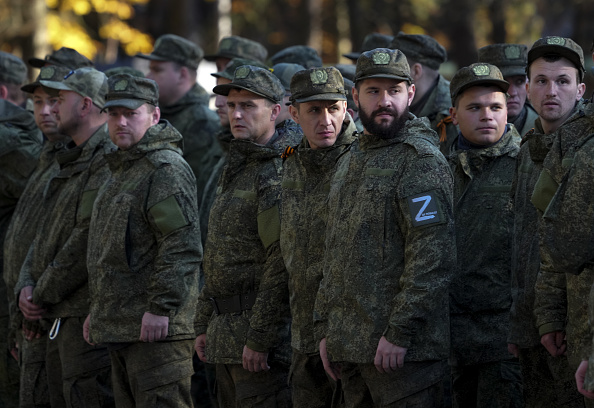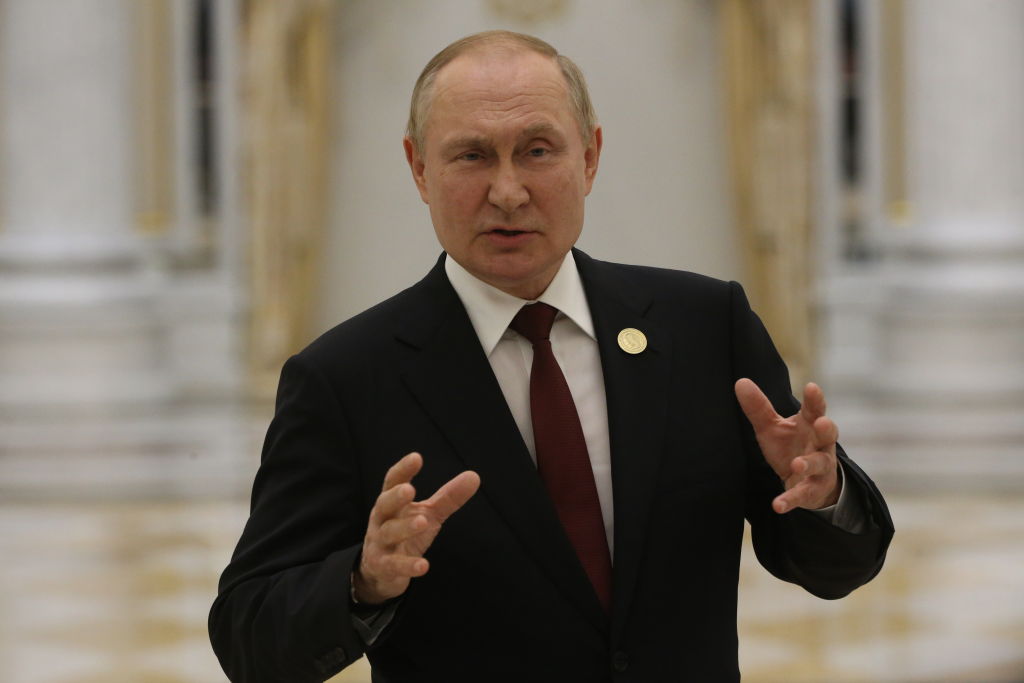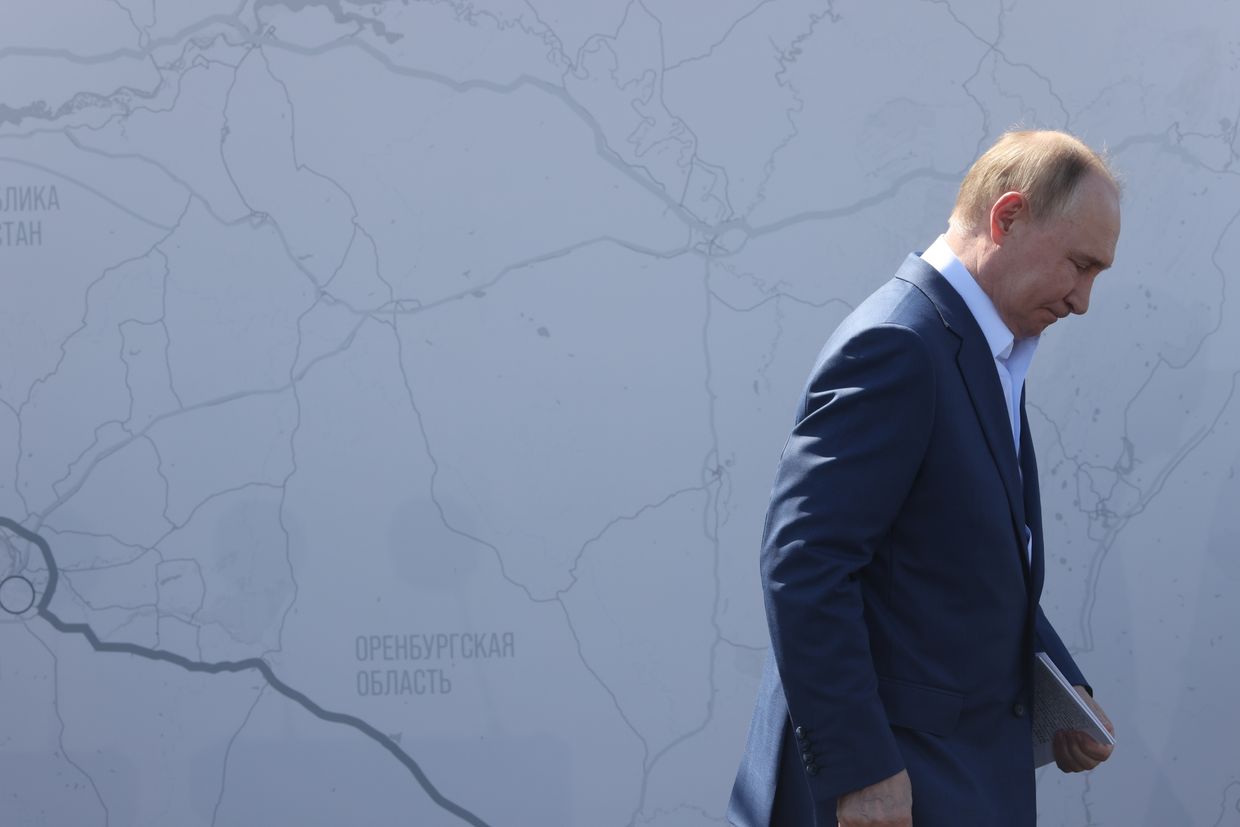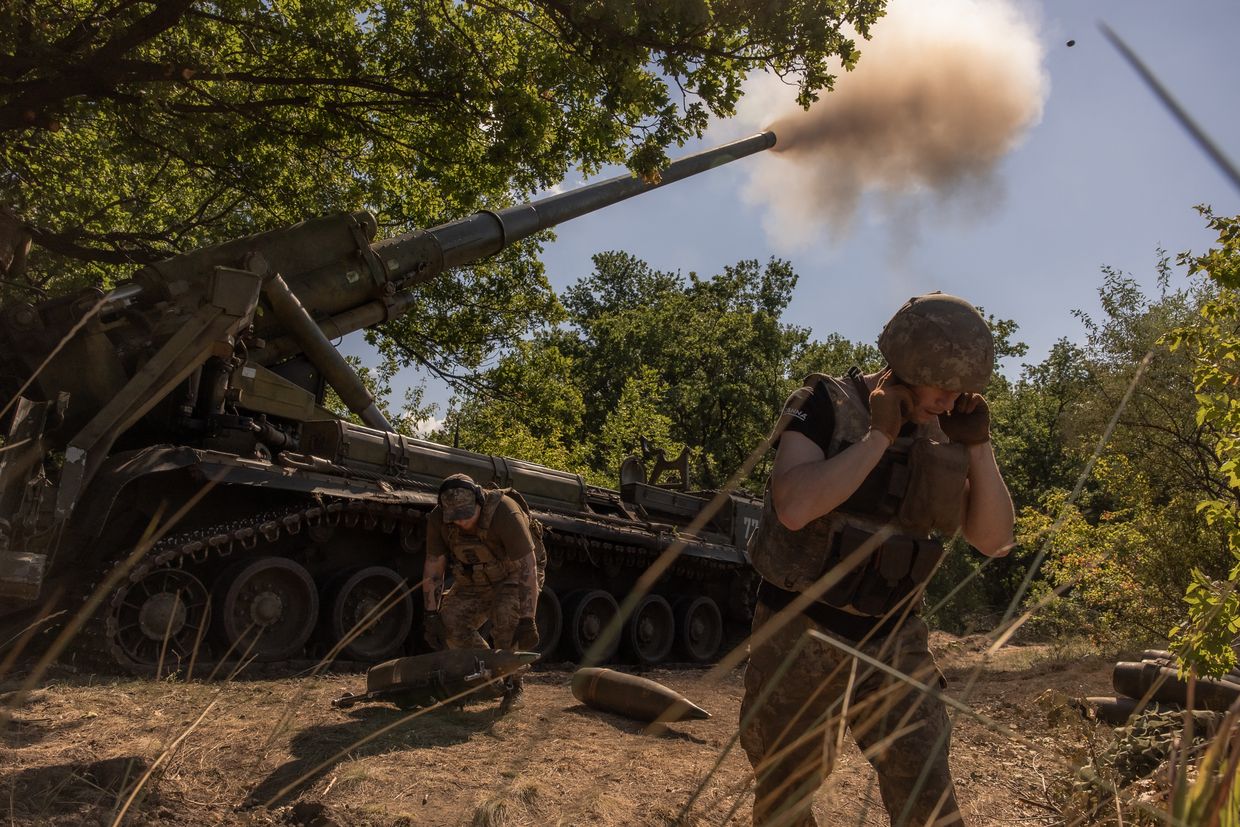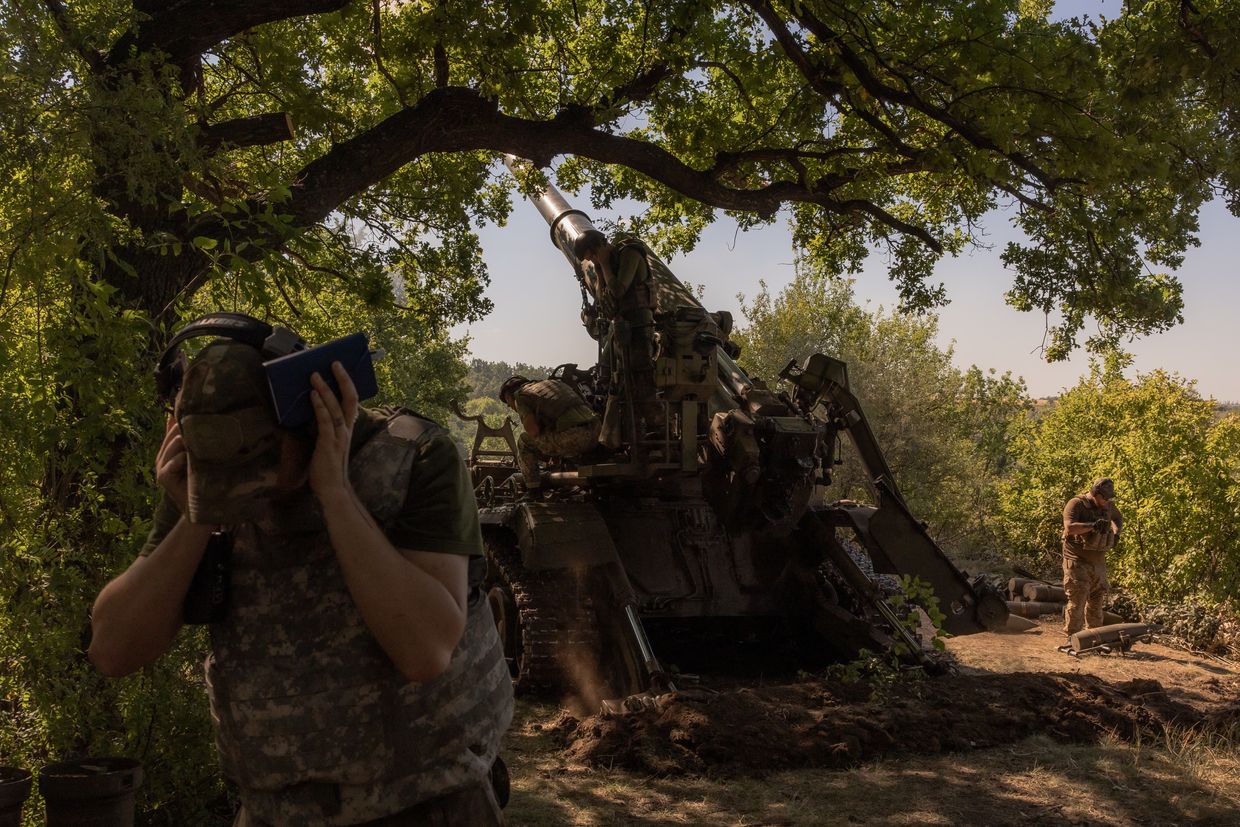Putin delays new mobilization, despite Kursk incursion exposing troop shortages
Kursk incursion exposes Russia’s manpower shortages but the Kremlin, fearing public backlash, hopes for gains without mobilization.

Russian military cadets take part in a rehearsal of the 79th anniversary military parade in central Saint Petersburg, Russia, on April 23, 2024. (Olga Maltseva / AFP via Getty Images)
Amid speculation that the Kremlin is considering a new mobilization of conscripts, some potential draftees say they are not enthusiastic about defending Russian territory just over a month after the Ukrainian incursion into Kursk Oblast.
"I won't go (to the front). I swore an oath to the Constitution, not to the criminals (in the Kremlin),” Ivan told the Kyiv Independent, referring to an oath he took during military training in college.
He spoke on condition of anonymity due to the fear of reprisals.
Ukraine's game-changing incursion into Kursk Oblast, which began on Aug. 6, exposed Russia's shortage of reserves and the potential need for further forced mobilization two and a half years into its full-scale invasion of Ukraine.
The Kursk incursion did not stop the grinding pace of Russia's offensive in Ukraine’s eastern Donetsk Oblast, which has intensified in recent weeks. However, Russia's ongoing eastern offensive since late 2023 has come with costly troop losses.
Around 120,000 Russian troops had been killed since the launch of the full-scale invasion of Ukraine, independent Russian media outlets Meduza and Mediazona reported on July 5. Ukraine's General Staff claimed on Sept. 11 that Russia had lost 628,930 troops, including both killed and wounded, since the beginning of its full-scale invasion of Ukraine. The figure could not be independently verified.
But analysts say that Russian President Vladimir Putin thinks Russia can still make gains on the front without resorting to mobilization, which would be politically and economically painful. This is why he may postpone mobilization even further, sticking with a policy that aims to make Russians feel the war is going according to plan and does not affect them.
“I think (a mobilization of conscripts is) unlikely,” U.S. military expert Michael Kofman told the Kyiv Independent. “There is no evidence of another mobilization. Manpower is a growing challenge for Russia relative to their objectives, but I suspect this is more a conversation for later in 2025.”
Putin dragged his feet before announcing the first mobilization of conscripts in September 2022, after his invading army’s attempt to capture Kyiv failed but swaths of territory in southern and eastern Ukraine were seized. That mobilization was carried out following Russia’s failure to hold the line in Kharkiv Oblast amid a lightning Ukrainian counteroffensive.

One of the reasons for the delay, experts think, is the Kremlin’s fear of social discontent, both from those supporting the war and those against.
"The worse the poll numbers, the more often the elite would think that Putin is not coping with his duties," Russian political analyst Dmitry Oreshkin told the Kyiv Independent.
Russia's reserves problem
Bloomberg reported last month that the Russian army is not receiving enough new soldiers to keep up with losses at the front, which are the heaviest since the start of the full-scale invasion in 2022. The news agency cited undisclosed sources close to the Kremlin and Russian Defense Ministry.
The need to replenish military reserves became more acute amid Ukraine's incursion into Kursk Oblast.
The situation may force Russia to announce a new mobilization of conscripts by the end of this year, Bloomberg reported, citing two sources who spoke on the condition of anonymity.

Russia's Defense Ministry claimed in December 2023 that it had recruited 640,000 contract soldiers since the fall of 2022. IStories and the Conflict Intelligence Team disputed this estimate in August 2024, saying that only 426,000 soldiers had received signing-on bonuses for contracts with the military.
One sign of Russia's problems with manpower is the skyrocketing payouts to volunteer fighters joining the military.
As it became harder for Russia to recruit soldiers, payouts for signing a contract with the military, including both federal and regional ones, reached more than 1 million rubles ($11,000) on average in August, according to the IStories investigative journalism project. The payouts in Moscow, St. Petersburg and Karachay-Cherkessia hit more than 2 million rubles ($22,000) the same month.
In comparison, payouts to contract soldiers amounted to around 200,000-300,000 rubles in early 2023.
Russian independent media outlet Novaya Gazeta reported in June that regional payouts to new recruits had increased by a whopping 80 times since the beginning of the full-scale invasion.
Speaking on Ukrainian television, military expert Kostyantyn Mashovets said on Sept. 6 that Russia had been trying to create new reserves but that the scale and pace of this reserve formation are much lower than before.
Due to the lack of reserves, Russia's General Staff is likely to persuade Putin to announce a new mobilization this fall, Mashovets said.
"The situation with reserves in Russia is clearly not what they had expected," he added.

Polish military analyst Konrad Muzyka told the Kyiv Independent that "as long as Russia is able to recruit 30,000 (volunteer fighters a month) minimum, I don't think they want to conduct the second wave of mobilization."
"(But) if we see a big drop in the recruitment numbers, then probably the second wave of mobilization will be possible," he added.
Vadym Skibitsky, a spokesman for Ukraine's military intelligence, said in January that about 30,000 volunteer fighters were signing contracts with the Russian military per month.
The Kyiv Independent could not independently verify this figure, and it is not clear if it has changed since then.
Russia's total number of troops included 1.3 million troops in August 2023, according to German data gathering agency Statista.
Russia's invasion force in Ukraine is smaller than the total number of troops.
Putin claimed in June that there were almost 700,000 Russian troops in Ukraine and Russian areas bordering Ukraine but the claim could not be independently verified. Ukraine's Commander-in-Chief Oleksandr Syrskyi said the same month that Russia's invasion force comprised 520,000 troops, and Russia was planning to increase it to 690,000 by the end of 2024.
Ukraine is estimated to have fewer troops. Zelensky said in January that the Ukrainian army included 880,000 troops. However, military analysts say that the part of the army involved in fighting on the front line is smaller.
Young conscripts
One way for Russia to avoid announcing a new mobilization is to instead use young conscripts who undergo compulsory military service every year.
Annual military service applies to men aged 18 to 30 in peacetime and wartime, while mobilization is only announced during a war and applies to men aged 18 to 55 — mostly those who have already served in the army or undergone military training.
Due to the lack of troops in Kursk Oblast, Russia has to use young conscripts en masse in the region, according to military analysts and independent Russian media.
The use of young conscripts in the war is a sensitive political issue since their service in the war is not voluntary, and it can potentially trigger protests from their mothers.
The death of contract soldiers does not cause a backlash from the Russian society because they serve voluntarily but conscripts are sent to the front by force, Russian political analyst Yekaterina Shulman told Deutsche Welle on Sept. 5.
"Conscripts are politically risky material," she added. "They are seen as children whom their mothers entrusted to the state. If one of them gets killed, it is perceived as an injustice."

However, the Kremlin probably calculates it can afford using young conscripts in Kursk Oblast since the scale of their deployment is not big enough, according to Russian political analyst Andrei Kolesnikov and a political analyst based in Russia who spoke on the condition of anonymity due to the fear of reprisals.
"Few people know about this and seriously pay attention to it. It has not become a nationwide topic due to the conditions of information blockades and repression," Kolesnikov said.
The analyst based in Russia said this is not a major problem for the Kremlin because "there are only a few thousand of these conscripts (in Kursk Oblast) at most."

Another way to tone down the problem for the Kremlin is to force these young conscripts to sign contracts with the military, Oreshkin told the Kyiv Independent. This way they formally cease to be conscripts and become volunteer fighters.
"Only one person out of a hundred can refuse to sign a contract under such pressure," he said.
A successful offensive?
However, the political analyst based in Russia argued that Russia would not carry out a mobilization any time soon because the Kremlin sees the situation on the front line as successful.
The Kremlin took a rational approach, not an emotional one, and decided not to redirect any significant reserves from Donetsk Oblast to Russia’s Kursk Oblast when the Ukrainian incursion began on Aug. 6, he said. Since Russia is still advancing in Donetsk Oblast, the Kremlin sees no need for mobilization, according to the analyst.
"They think they are winning the war," he said. "As long as everything goes well, Putin will not carry out a mobilization."
Putin boasted about Russia's alleged military successes on Sept. 5, claiming that Ukraine had "weakened itself" by launching its operation in Kursk Oblast. Ukraine transferred "fairly large and well-trained units" to Kursk Oblast, allowing Russian troops to accelerate their offensive in the east of Ukraine, Putin claimed.
Moreover, the Kremlin does not need to announce a mobilization now because "it seems like they don't intend to reclaim the occupied territories (in Kursk Oblast in the near future), and not much is needed just to hold them," the analyst based in Russia said.
Public discontent
Another reason why mobilization is likely to be postponed is its unpopularity.
Putin's approval rating fell from 83% in August 2022 to 77% in September 2022 amid the first mobilization, according to the Levada Center.
According to the Levada Center, 47% of the respondents felt "anxiety, fear and terror" due to the first mobilization in September 2022.
Oreshkin said that Putin "will avoid mobilization until the very last moment" because it would provoke social discontent and a drop in his approval rating.
Mobilization would "affect the entire country" and would mean that "the war has entered every home," Oreshkin told the Kyiv Independent.
"Putin believes the entire nation supports him. It's important for the polls to show he's doing everything right," Oreshkin said.
A popular uprising is unlikely because of Russia's harsh authoritarian regime but such popular discontent could trigger a coup d'etat, Oreshkin added.
Kolesnikov agreed that mobilization would be hugely unpopular.
"Mobilization would destroy an unwritten social contract according to which social peace is maintained because the majority of the male population is not sent to the trenches, and in principle, the population of Russia retains the possibility of private life and distancing themselves from the war," he said. "This suits both the majority of the population and the authorities."
A popular uprising is unlikely.
Another factor that impedes mobilization is its economic impact.
"Mobilization will objectively hit the economy hard; it's not just a political problem anymore," the political analyst based in Russia said. "The country is facing a severe labor shortage."
Popular mood
According to an August poll by the Levada Center, 24% of the respondents expected a second wave of mobilization in the upcoming months, up from 18% in February.
The number of those who think mobilization was necessary rose from 10% in February to 13% in August.
According to the Levada Center, 46% of the respondents were worried in August about the possibility of mobilization.

Ivan, a potential conscript, told the Kyiv Independent that, if a mobilization is announced, he would try to move to another city or abroad -- unless the borders are closed.
He said that he moved to Georgia for a short time after the first mobilization was announced in 2022.
Konstantin, who supports Russia’s war but does not want to fight himself, does not expect to be mobilized. He thinks the authorities "have got things organized, recruited as many (contract soldiers) as needed, they’re still continuing to recruit, and they pay well for a contract."
A third potential conscript, Yury, said he would try to avoid conscription and was considering leaving the country.
“Let’s put it this way: during another one or two waves (of mobilization) I’ll probably slip through if there’s no force majeure but after that the chances of getting caught in the mess increase significantly,” he said.
Kyiv Independent reporter Asami Terajima contributed to this report.
Editor's note: The names of potential Russian conscripts were changed due to the fear of reprisals.


